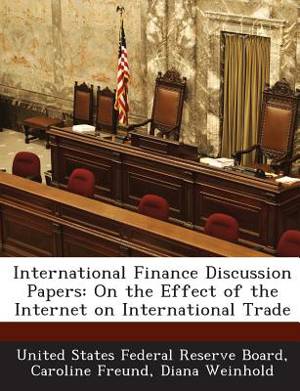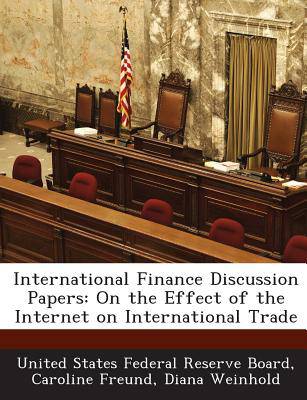
- Afhalen na 1 uur in een winkel met voorraad
- Gratis thuislevering in België vanaf € 30
- Ruim aanbod met 7 miljoen producten
- Afhalen na 1 uur in een winkel met voorraad
- Gratis thuislevering in België vanaf € 30
- Ruim aanbod met 7 miljoen producten
Zoeken
International Finance Discussion Papers
On the Effect of the Internet on International Trade
Caroline Freund, Diana Weinhold
Paperback | Engels
€ 21,95
+ 43 punten
Omschrijving
The Internet stimulates trade. Using a gravity equation of trade among 56 countries, we find no evidence of an effect of the Internet on total trade flows in 1995 and only weak evidence of an effect in 1996. However, we find an increasing and significant impact from 1997 to 1999. Specifically, our results imply that a 10 percent increase in the relative number of web hosts in one country would have led to about 1 percent greater trade in 1998 and 1999. Surprisingly, we find that the effect of the Internet on trade has been stronger for poor countries than for rich countries, and that there is little evidence that the Internet has reduced the impact of distance on trade. The evidence is consistent with a model in which the Internet creates a global exchange for goods, thereby reducing market-specific sunk costs of exporting.
Specificaties
Betrokkenen
- Auteur(s):
- Uitgeverij:
Inhoud
- Aantal bladzijden:
- 46
- Taal:
- Engels
Eigenschappen
- Productcode (EAN):
- 9781288731527
- Verschijningsdatum:
- 8/02/2013
- Uitvoering:
- Paperback
- Formaat:
- Trade paperback (VS)
- Afmetingen:
- 189 mm x 246 mm
- Gewicht:
- 99 g

Alleen bij Standaard Boekhandel
+ 43 punten op je klantenkaart van Standaard Boekhandel
Beoordelingen
We publiceren alleen reviews die voldoen aan de voorwaarden voor reviews. Bekijk onze voorwaarden voor reviews.











